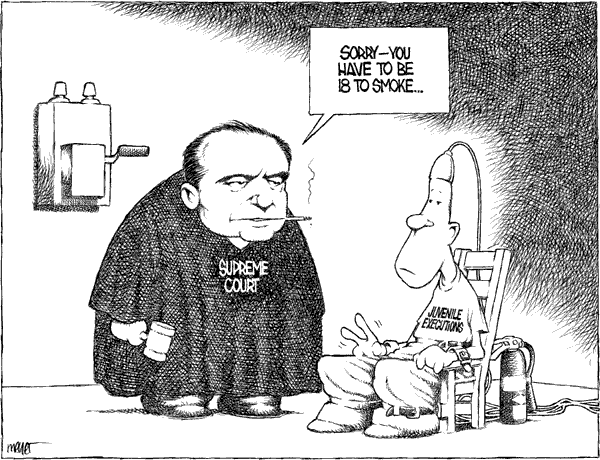Death Penalty Double-Standard
On June 20, 2002, the United States Supreme Court finally declared that executing the mentally retarded is cruel and unusual and therefore a violation of the U.S. Constitution. A few months later, on October 21, this same Court refused to put an end to executing juveniles. This shows a clear double-standard since all their cited reasons for not executing the retarded apply equally to youth.
In Daryl Renard Atkins v. Virginia, the Supreme Court gave several reasons that executing the retarded should be deemed cruel and unusual. One reason was that more than half of our 50 states had outlawed executing the retarded (including the 12 states that don't use the death penalty at all). "The practice, therefore, has become truly unusual," wrote Justice Stevens in the majority opinion, "and it is fair to say that a national consensus has developed against it."
By the same reasoning, however, America also has a "national consensus" against executing "minors." Of America's 50 states, 28 (more than half) prohibit executing those who were younger than 18 at the time of their arrest (1).
In Atkins v. Virginia, the Court also said there was an international consensus against executing the retarded since most nations refuse to do it. As Stevens put is, "Within the world community, the imposition of the death penalty for crimes committed by mentally retarded offenders is overwhelmingly disapproved."
Is the same true of executing juveniles? Absolutely. The world has more than 190 nations. Since 1979, only five of those nations have executed juveniles: Rwanda, Pakistan, Barbados, Bangladesh, and the U.S.A. (2).
Pakistan recently agreed to stop (3). They are stepping forward in human rights and fairness for children and teenagers, while the U.S. Supreme Court keeps America's legs shackled.
Yet another reason given for not executing the retarded: while the death penalty is often accepted and supported as a deterrent to crime, it cannot deter those who lack the mental capacity to understand the risk they run by breaking the law.
Shouldn't the government use this same reasoning for youth? Think of all the times we've heard a law-maker defend some new age-restriction by telling us, "Kids all think they're invulnerable. Kids think bad things can only happen to other people." If this is true, no penalty can deter youth from breaking the law since youth will assume they're invulnerable to capture and punishment. Therefore, executing youth is pointless; and to kill someone pointlessly is cruel. If, on the other hand, it is not true that youth "all think they're invulnerable," then politicians should admit it is a lie and should stop using this lie to justify everything from age-restrictions on driving to age-restrictions on tobacco.
The Supreme Court further declared we must stop executing the retarded because "their impairments can jeopardize the reliability and fairness of capital proceedings against mentally retarded defendants." In other words, the retarded have a hard time defending themselves and getting a fair trial. What about youth? Can teenagers get a fair trial? Juveniles are not even allowed a jury of their peers. And given America's current political climate of hostility against youth, it's hard for old jurors to judge young defendants fairly *.
Despite all these parallels, the Supreme Court banned executing the retarded by a 6-3 vote; but the same Court refused to even hear arguments against executing youth. To their credit, Justices Stevens, Breyer, Ginsburg, and Souter voted to hear the case. But they were outnumbered by the rest. The remaining five included O'Connor and Kennedy, who had voted to protect the retarded from execution, but who now voted to turn a deaf ear to the pleas of the young.
Update 3/05: Finally
The Supreme Court has finally recognized the hypocrisy described here. In a 5-4 decision on March 1, 2005, they decided to ban executing minors. Writing for the majority, Justice Kennedy noted that the U.S. was the only nation left that still executed minors. With this ruling, the United States reclaims its place the world community.
It shouldn't surprise us to see Sandra Day O'Connor among the four dissenters.
More on the Supreme Court and youth.
-----------------------
Notes:
Sources:

